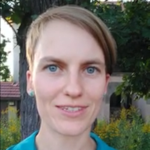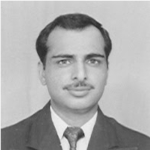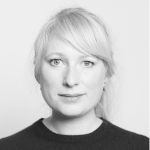We are pleased to confirm our 2021 Winner and Runners Up
Register to watch our 2021 ceremony on-demand



2021 Winner
 Zuzana Burivalova is the principal investigator of the Sound Forest Lab. She is a tropical forest ecologist and conservation scientist, based in the department of Forest & Wildlife Ecology and The Nelson Institute for Environmental Studies at the University of Wisconsin-Madison, where she is an assistant professor. She and her team look for ways to protect biodiversity in tropical forests, both forests that are used by humans, for logging, and forests set aside for conservation, from national parks to small community protected areas. Her work is aimed at answering tricky questions in tropical forest ecology using new technologies, such as through recording and analyzing soundscapes, where traditional field methods fall short. She also leads the ConservationEffectiveness.org platform, which she co-funded together with the environmental news platform Mongabay.com, to understand and communicate which conservation strategies succeed and fail in tropical forests.
Zuzana Burivalova is the principal investigator of the Sound Forest Lab. She is a tropical forest ecologist and conservation scientist, based in the department of Forest & Wildlife Ecology and The Nelson Institute for Environmental Studies at the University of Wisconsin-Madison, where she is an assistant professor. She and her team look for ways to protect biodiversity in tropical forests, both forests that are used by humans, for logging, and forests set aside for conservation, from national parks to small community protected areas. Her work is aimed at answering tricky questions in tropical forest ecology using new technologies, such as through recording and analyzing soundscapes, where traditional field methods fall short. She also leads the ConservationEffectiveness.org platform, which she co-funded together with the environmental news platform Mongabay.com, to understand and communicate which conservation strategies succeed and fail in tropical forests.
2021 Runners Up
 Muhammad Afzal is working as a principal scientist at National Institute for Biotechnology and Genetic Engineering, Pakistan, where he leads the Wastewater Treatment and Phytoremediation Group and heads the Environmental Monitoring Laboratory. He has extensive research experience in devising low-cost, self-sustaining, and environment-friendly technologies for the remediation of polluted soil and wastewater and pioneered the introduction of “Floating Treatment Wetlands” technology in Pakistan at a field scale for the treatment of sewage and industrial wastewater. Indigenous wetland plants were selected to develop floating treatment wetlands (FTWs) and a buoyant mat locally designed and fabricated, which was 500 times less expensive than the mat available in the international market. Several national and international research grants support the development of this technology for Pakistani communities. Muhammad was recently awarded a Gold Medal by the Pakistan Academy of Sciences.
Muhammad Afzal is working as a principal scientist at National Institute for Biotechnology and Genetic Engineering, Pakistan, where he leads the Wastewater Treatment and Phytoremediation Group and heads the Environmental Monitoring Laboratory. He has extensive research experience in devising low-cost, self-sustaining, and environment-friendly technologies for the remediation of polluted soil and wastewater and pioneered the introduction of “Floating Treatment Wetlands” technology in Pakistan at a field scale for the treatment of sewage and industrial wastewater. Indigenous wetland plants were selected to develop floating treatment wetlands (FTWs) and a buoyant mat locally designed and fabricated, which was 500 times less expensive than the mat available in the international market. Several national and international research grants support the development of this technology for Pakistani communities. Muhammad was recently awarded a Gold Medal by the Pakistan Academy of Sciences.
 James Hassell is assistant professor adjunct of epidemiology at Yale School of Public Health and a wildlife veterinarian, epidemiologist and Keller Family Skorton Scholar for the Smithsonian’s Global Health Program. He leads and advances the program's work in Kenya, which combines research, clinical work and training to improve the health of co-existing wildlife populations, human communities and their livestock.His research interests focus on disease transmission between wildlife, livestock and humans primarily in urban (but also rangeland) settings, using technological advances to determine how transfer of pathogens between species is determined by the ecosystems they inhabit. Through the research and training he delivers for scientists and veterinarians in Kenya and the US, he aims to promote the conservation of species and their ecosystems, while protecting human and wildlife health. James is undertaking a zoological medicine residency with a focus on wildlife population health through the University of Liverpool.
James Hassell is assistant professor adjunct of epidemiology at Yale School of Public Health and a wildlife veterinarian, epidemiologist and Keller Family Skorton Scholar for the Smithsonian’s Global Health Program. He leads and advances the program's work in Kenya, which combines research, clinical work and training to improve the health of co-existing wildlife populations, human communities and their livestock.His research interests focus on disease transmission between wildlife, livestock and humans primarily in urban (but also rangeland) settings, using technological advances to determine how transfer of pathogens between species is determined by the ecosystems they inhabit. Through the research and training he delivers for scientists and veterinarians in Kenya and the US, he aims to promote the conservation of species and their ecosystems, while protecting human and wildlife health. James is undertaking a zoological medicine residency with a focus on wildlife population health through the University of Liverpool.
Judges special commendation
 Brenda Parker is an associate professor in sustainable bioprocess design at the Department of Biochemical Engineering, UCL and is co-director of the Bio-ID Lab. Her research and teaching are highly interdisciplinary, bringing together the fields of environmental biotechnology, sustainability and design to address and mitigate pollution. In 2014 Brenda was awarded a Churchill Fellowship to investigate the role of design for bioremediation, and subsequently she has developed a research platform to pioneer this field. In partnership with the Bartlett School of Architecture, she has developed a new postgraduate programme in Bio-Integrated Design. Brenda holds an MEng Biochemical Engineering from UCL and conducted her Masters research year at the California Institute of Technology. Following this she conducted an industrial PhD with Dowpharma, applying directed evolution techniques for green chemistry. Her postdoctoral research was conducted as part of the Algal Biotechnology Consortium at the University of Cambridge, investigating biomimetic process design methods for the manufacture of algal biofuels. Since then, Brenda has worked on biomanufacturing with photosynthetic organisms for over ten years. Before joining UCL, Brenda led on applied phycology work with industry as part of the EU-funded Energetic Algae project.
Brenda Parker is an associate professor in sustainable bioprocess design at the Department of Biochemical Engineering, UCL and is co-director of the Bio-ID Lab. Her research and teaching are highly interdisciplinary, bringing together the fields of environmental biotechnology, sustainability and design to address and mitigate pollution. In 2014 Brenda was awarded a Churchill Fellowship to investigate the role of design for bioremediation, and subsequently she has developed a research platform to pioneer this field. In partnership with the Bartlett School of Architecture, she has developed a new postgraduate programme in Bio-Integrated Design. Brenda holds an MEng Biochemical Engineering from UCL and conducted her Masters research year at the California Institute of Technology. Following this she conducted an industrial PhD with Dowpharma, applying directed evolution techniques for green chemistry. Her postdoctoral research was conducted as part of the Algal Biotechnology Consortium at the University of Cambridge, investigating biomimetic process design methods for the manufacture of algal biofuels. Since then, Brenda has worked on biomanufacturing with photosynthetic organisms for over ten years. Before joining UCL, Brenda led on applied phycology work with industry as part of the EU-funded Energetic Algae project.









